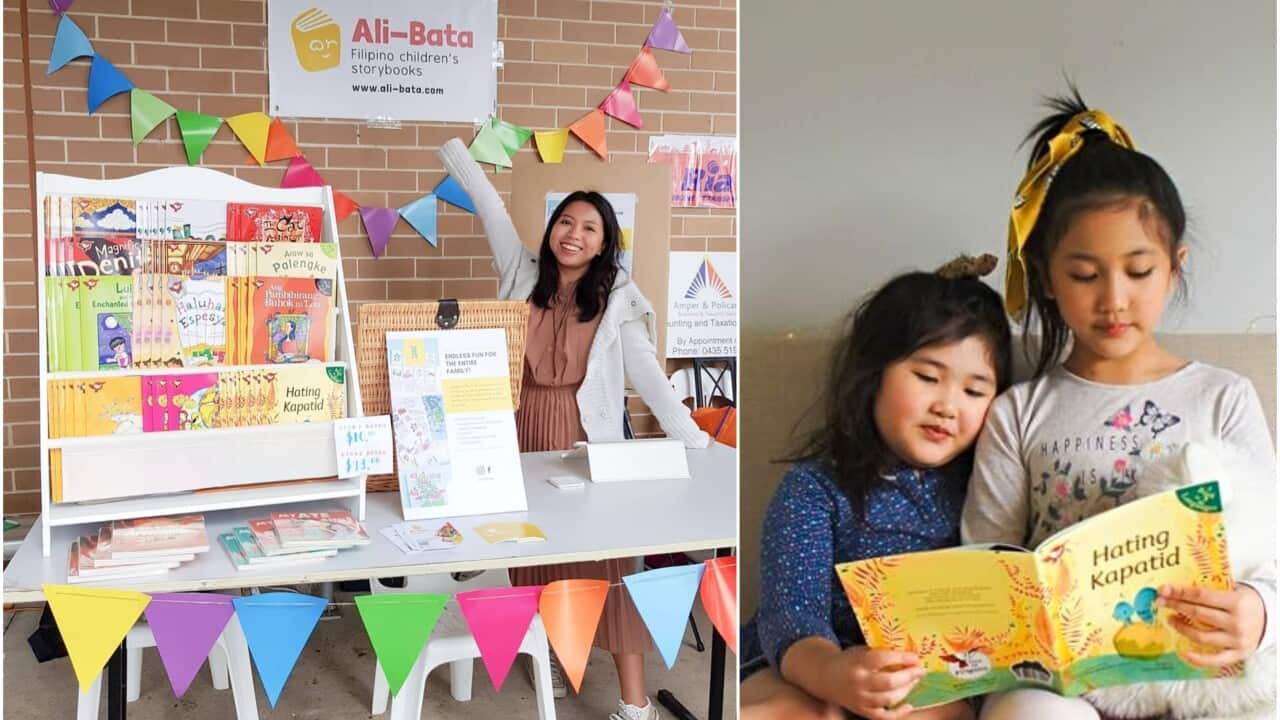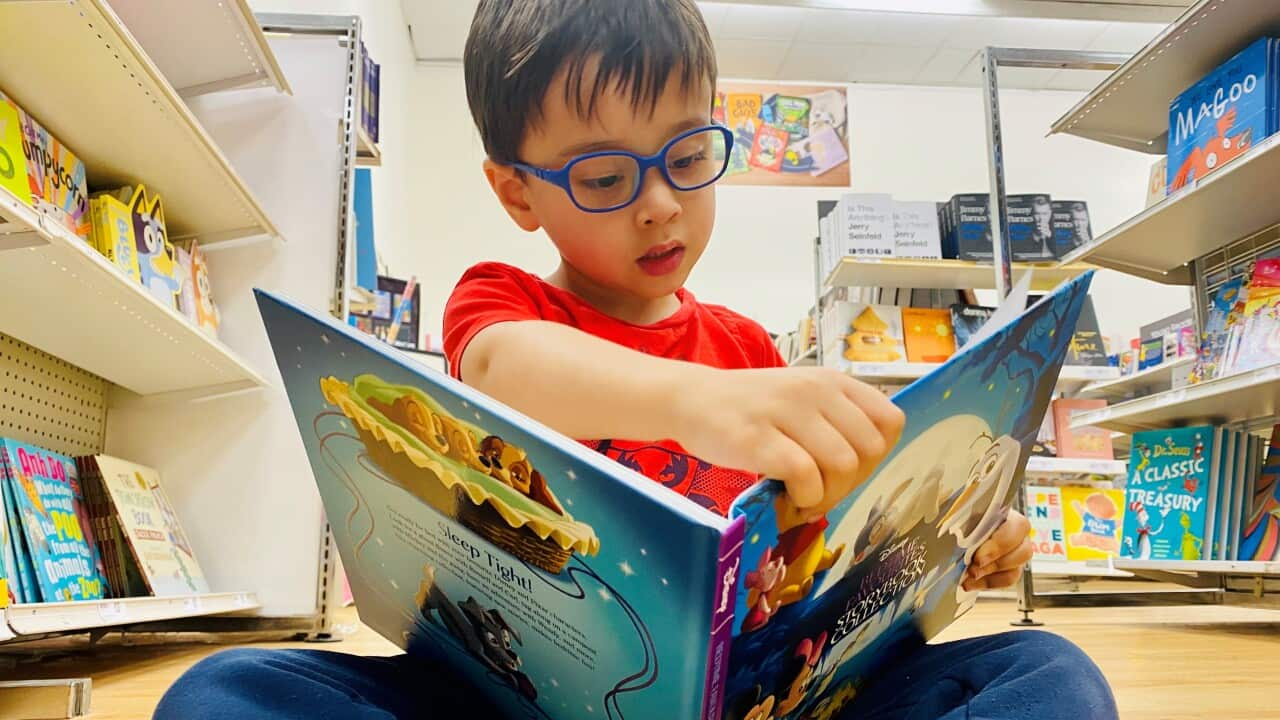"My mum called the other day and the signal kept on dropping. My toddler goes, 'Ay naku naman, lola!' [Oh my goodness, grandma!]. He's starting to connect the simple words he's read to real life."
Kaye Marfori-Sedicol has been making a conscious effort to integrate the Filipino language and culture in their Australian household through food, the practice of 'mano' [blessing of hand to head], 'po' and 'opo' [respectful 'yes'] and Filipino children's books.
Highlights
- Kaye is a chef, early childhood educator and mum.
- Through her business, abakada.au, Kaye brings Filipino children's books catered for 1-7 years old.
- She seeks to have Filipino book readings in libraries and childcare settings.
My Fil-Aus kids
Kaye wears many hats. She's an entrepreneur, chef, early childhood educator and mum-of-two.
"I initially just came to Australia to study culinary in Le Cordon Bleu; but I grew up in the Philippines. That's where I was born and where I am from." "I met my husband here. He grew up in Australia. His family is from Cebu and he knows a few Cebuano expressions," she shares, laughing, "He didn't know Tagalog, but he was forced to start learning when he met me. My parents also talk to him in Filipino."
"I met my husband here. He grew up in Australia. His family is from Cebu and he knows a few Cebuano expressions," she shares, laughing, "He didn't know Tagalog, but he was forced to start learning when he met me. My parents also talk to him in Filipino."

"I initially just came to Australia to study culinary in Le Cordon Bleu; but I grew up in the Philippines." Source: Kaye Marfori-Sedicol
Kaye's parents also urged her to teach her children the language.
"When I was pregnant with my first-born, my parents would say to me that I should teach him Filipino. There's an advantage to knowing two languages; plus, when we go visit the Philippines, he'll be able to understand other kids. He won't feel alienated."

The Sedicol family Source: Kaye Marfori-Sedicol
"He would go to daycare three days a week while I worked. He spoke English the whole day and daycare is where he learned how to communicate and socialise.
"While that's great, his Filipino was taking a backseat. It made me realise that I needed to do something."
The books and the flashcards
That something became abakada.au, an online store selling Filipino children's books and flashcards.
"I used to bake Filipino desserts. That was my way of keeping my culture alive; but with two kids, I didn't have much time for it. I became proactive when it came to looking for another avenue to celebrate my being Filipino. "I was having a conversation with my fellow mama, a friend based in Vancouver. We talked about teaching our kids Filipino and the books we bought back home. She did a trial run in Canada and it was a success. I decided to do the same here."
"I was having a conversation with my fellow mama, a friend based in Vancouver. We talked about teaching our kids Filipino and the books we bought back home. She did a trial run in Canada and it was a success. I decided to do the same here."

"I used to bake Filipino desserts. That was my way of keeping my culture alive." Source: Kaye Marfori-Sedicol
Kaye got in touch with Tahanan Publishing, a publisher in the Philippines focused on Filipino children's books.
"I asked them if I could be a reseller. They were excited because they didn't have a reseller here who exclusively sold Filipino books.
"I love that the books we carry are relatable to the Filipino kids growing up in Australia." Two of the most popular books Kaye carries is A for Adobo and Ay Naku!
Two of the most popular books Kaye carries is A for Adobo and Ay Naku!

Two of the most popular relatable books Kaye carries is A for Adobo and Ay Naku! Source: Supplied
"My first love is food and cooking, so 'A for Adobo' is one that I really like. Not only does it teach kids about the alphabet, they get to learn about Filipino food as well.
"Another favourite is 'Ay Naku!' I have one customer whose son told her 'Mum, that's what you always say! You say Ay naku! when you're cranky!"
Aside from the two books, Kaye's son is also fond of Araw ng Kabaligtaran [Opposite Day]. "He finds it funny when the girl in the story says 'Magandang gabi!' [Good night!] when she wakes up in the morning," Kaye laughs.
"He finds it funny when the girl in the story says 'Magandang gabi!' [Good night!] when she wakes up in the morning," Kaye laughs.

Araw ng Kabaligtaran Source: Supplied
Aside from funny and relatable books, Kaye also utilises and offers Filipino flashcards.
"As a mum, I noticed that a lot of the materials used to teach kids how to speak are flashcards. "The flashcard sets we have are called Buksan [Open]. They come in different topics, with varying degrees of difficulty. There are sets for emtoions, counting, the basics; and then you level up to things seen in school, clothing. They're divided in such a way so that the words aren't overwhelming to learn."
"The flashcard sets we have are called Buksan [Open]. They come in different topics, with varying degrees of difficulty. There are sets for emtoions, counting, the basics; and then you level up to things seen in school, clothing. They're divided in such a way so that the words aren't overwhelming to learn."

"They're divided in such a way so that the words aren't overwhelming to learn." Source: Supplied
The future is Filipino
When it comes to learning, Kaye believes that making it fun and relatable allows for better retention.
"I worked in daycare, that's why educating through books and learning through play are close to my heart.
"Australia is diverse and we get a lot of different books in centres and libraries. "I would love to be able to go to a Filipino area like Blacktown in the future and do a book reading. I also want to be able to bring Filipino books to childcare centres because we don't have much representation at the moment. Small steps like that can lead to big things."
"I would love to be able to go to a Filipino area like Blacktown in the future and do a book reading. I also want to be able to bring Filipino books to childcare centres because we don't have much representation at the moment. Small steps like that can lead to big things."

Kaye hopes that Filipino books can find their way into libraries and childcare centres. Source: Kaye Marfori-Sedicol



